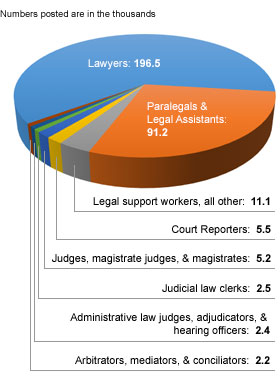Court reporters utilize listening and writing skills to transcribe word-for-word reports at legal proceedings. Most work for the state or local governments in courts or legislatures; however, some court reporters may even lend their talents to translating for the hearing-impaired at other events and settings.
How to Become a Court Reporter
While having a bachelor’s degree is not standard for most court reporting jobs, these professionals usually complete postsecondary certificate programs available through many community colleges and technical institutes. For those working in legal settings, court reporters may need licensing or certification by a professional association under some state laws.
In terms of the formal training programs, students should expect to take courses mixed in English and law. These might include both grammar and phonetics courses as well as those focusing on legal policies and terminology. Some programs might even include training students to use transcription machines, including the stenotype machine. Overall, court reporters must typically complete continuing education classes and online training to ensure that they’re up to date with policies.
For potential court reporters looking to get certified, the National Court Reporters Association (NCRA) offers certification for court reporters, broadcast captioners, and Communication Access Real-Time Translation (CART) providers. The process includes successful completion of a written test and a 3-part skills test that in part will weigh on how many words the person can type per minute. The American Association of Electronic Reporters and Transcribers (AAERT) offers certification for digital and voice reporters in two forms: as a Certified Electronic Reporter (CER) and Certified Electronic Transcriber (CET). Both certifications require the successful completion of a written test and a skill test.
Much of the training for a court reporter will usually come on the job, and many will have to complete a certain amount of hours to ensure that they understand the specific legal terminology relevant to transcribing the various types of proceedings.
Salary
According to a Bureau of Labor Statistics (BLS) report, the median annual wage for court reporters was $48,160 in May 2012, with the lowest 10 percent earning less than $24,790 and the top 10 percent earning more than $90,530. Some court reporters work freelance, meaning they’d be compensated for their work, but can also sell their transcripts at an additional fee.
Work Life
Most court reporters work on a relatively standard full-time schedule. This is especially true for those working in court settings, recording events, or preparing transcripts. The job requires that court reporters play close attention in legal proceedings, as transcribing word for word requires great attention to detail.
Citation
Bureau of Labor Statistics, U.S. Department of Labor, Occupational Outlook Handbook, 2014-15 Edition, Court Reporters,
on the Internet at http://www.bls.gov/ooh/legal/court-reporters.htm (visited October 14, 2014).
